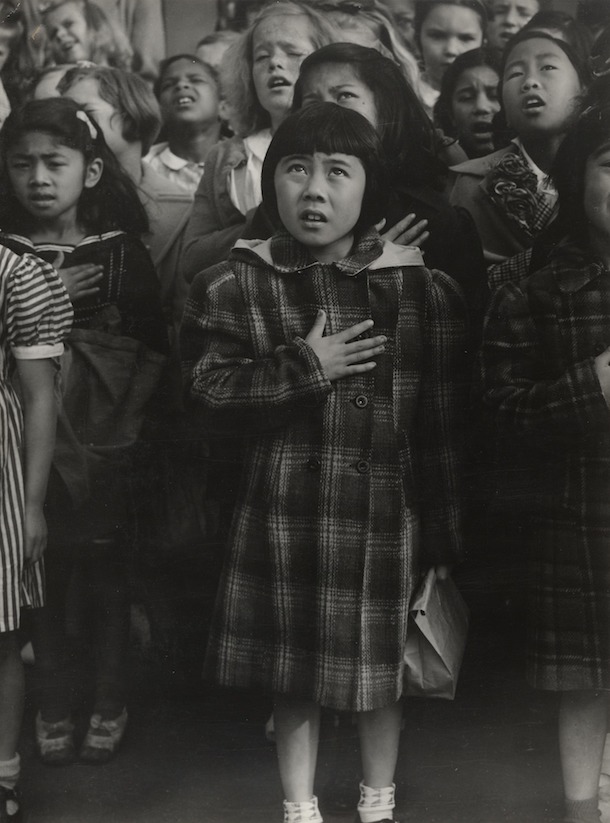
Dorothea Lange One nation indivisible. San Francisco 1942

France, Spain increase their lockdown measures, but France and Germany still exist on holding their municipal elections. Must be more important than virus response. More important than the survival of small firms too.
In France, over half of COVID19 patients in intensive care are under 60. Holland has 40-50 patients in intensive care, over half of whom are under 50. Some are children. The family of a 16-year old boy on life support in IC pleads with people to take the disease seriously.
Politicians of all colors invent the wheel as they go along, mostly as ignorant as the media whose ignorant news stories they base their decisions on. The model is simple: do the same as others do, so you can blame them when things go awry.
Belgium shut all its stores and bars, Holland did not yet, so Belgians go drinking in cramped Dutch bars en masse. The EU says it has few powers in this, thus ensuring it can’t be blamed.
The US is set for the worst disaster of all, it has to enforce travel restrictions very rapidly or else, ground domestic flights, close down highways, the works. And get hospitals working for ten times as many patients as they’re designed for. Good luck.
The calls for a UBI will grow louder at both sides of the Atlantic, and the power bastions will reject them with equal vehemence and bail out zombie companies instead. Our political systems work only in good times.
• Cases 157,477 (+ 11,150 from yesterday’s 146,327)
• Deaths 5,845 (+ 402 from yesterday’s 5,443)
The numbers in this graph are terrifying. 3,500 new cases in Italy in 24 hours.
From Worldometer yesterday evening (before their day’s close)
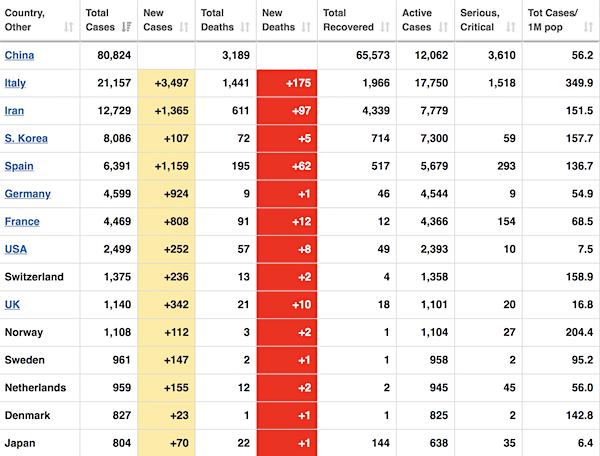
This set of graphs from Worldometer has turned almost straight north:
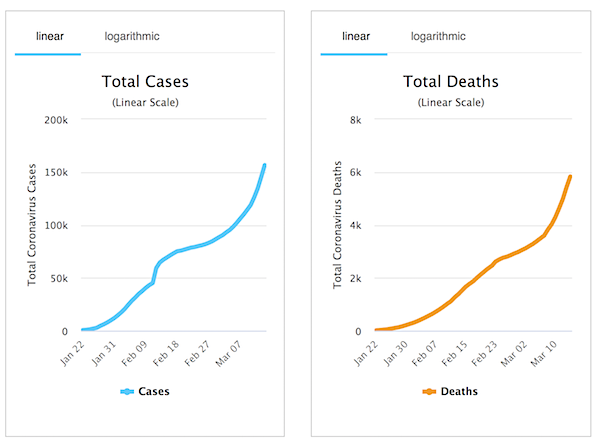
From Worldometer (NOTE: mortality rate is back up to 7%!)
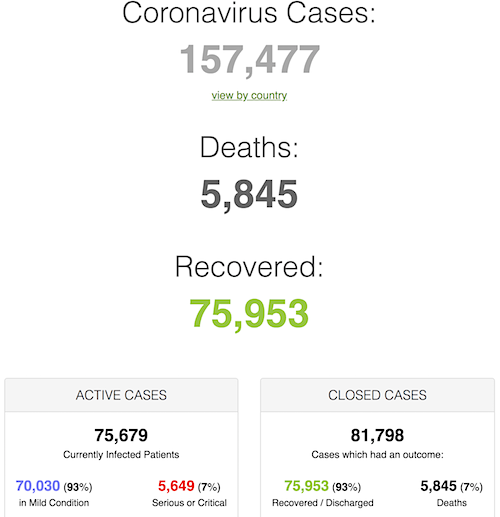
From SCMP: (Note: the SCMP graph was useful when China was the focal point; they are falling behind now)
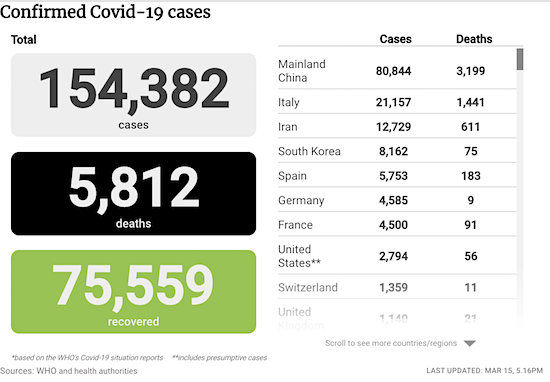
From COVID2019.app: (New format lacks new cases and deaths)
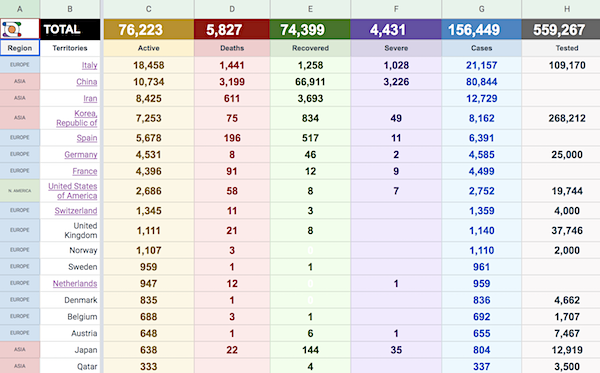

“Close everything but grocery stores, banks, and pharmacies. Convert schools into food distribution centers. Bring in the National Guard to provide essential services like food and augment police and emergency services. Issue checks to all New Yorkers for the length of the quarantine for at least $500 per person per month.”
• New York Will Be The Next Italy (M.)
Analysis strongly suggests that the NYC metro area has 5–10 days to quarantine the city or face dramatically overwhelmed hospitals, extremely high death rates, and a ruined economy. The outlook for NYC and COVID-19 is bleak. The policy response is far too slow and too weak to meet the needs of the moment.
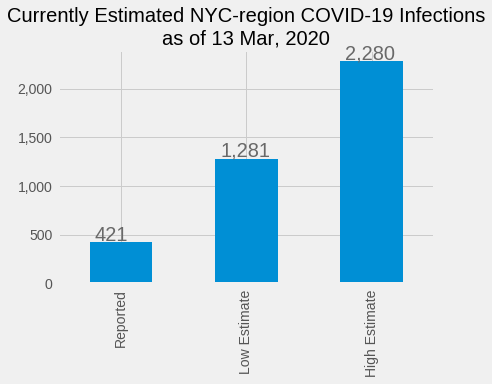
The Analysis – The NYC region has approximately 400 cases reported as of Friday Mar 13. That number is obviously an underestimate. After accounting for undercounting of asymptomatic cases and failing to detect cases due to under testing, we estimate that between 1,281 and 2,280 people are infected as of yesterday.
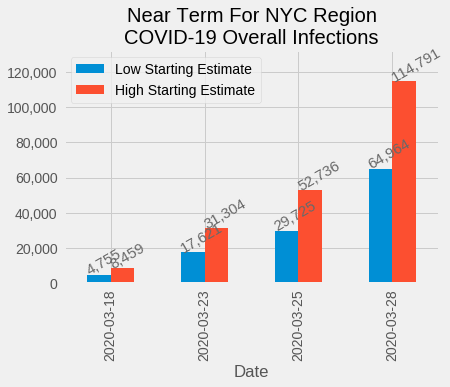
Using an SIR Epidemiology Model (described in greater detail in my previous Medium post), we can use the Low and High estimates for infections on 3/13 to project #COVID19 growth through March. Then using those projections for infections, we can use a conservative 10% severity rate to get the number of people who are infected on that day that will require hospitalization (severe & critical cases).
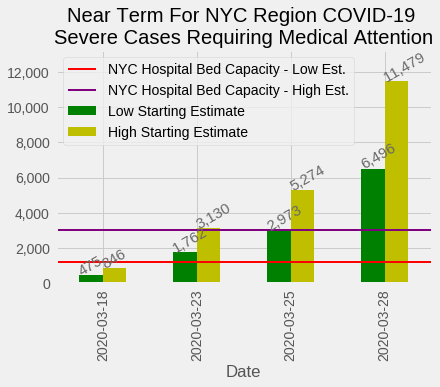
The NYC region has between 1,200 and 3,000 open hospital beds. This analysis suggests that enough people will become infected by March 23 and March 25 that NYC’s hospitals will be fully at capacity approximately 7 days later. (Infected people who will become severely ill do not immediately need medical care upon being infected. There is approximately a 5–7 day incubation period. After which, most severe cases present to the hospital within 2–3 days.)
The Obvious Choice – NYC must implement more severe social distancing measures and potentially fully shut down no later than a week from now in order to avoid overwhelming its hospital system. Think about the choices here: The Status Quo: The governor and the mayor continue to allow the virus to spread at schools, subways, restaurants, cafes, and workplaces. This is the exact same approach Italy took at the beginning of its outbreak. Seriously take a look at this article from two and a half weeks ago when Italy only had 160 cases (vs NYC’s 500+).
“Strict emergency measures were put in place over the weekend, including a ban on public events in at least 10 municipalities, after a spike in confirmed cases in the northern regions of Lombardy and Veneto. Italy’s Health Minister Roberto Speranza announced severe restrictions in the affected regions, which included the closure of public buildings, limited transport, and the surveillance and quarantine of individuals who may have been exposed to the virus. “We are asking basically that everyone who has come from areas stricken by the epidemic to remain under a mandatory house stay,” Speranza said at a Saturday press conference.” — CNN, Feb 24 2020
Sound familiar? It’s the exact same thing New York is trying now. It won’t work here either. After that fails here too, we will wind up with the Italian situation. Overflowing hospitals. Demand at two, three, five times the capacity of the hospitals’ ability to deliver care. What’s worse is that their capacity will decline as cases overflow. Their doctors and nurses will be exposed and have to be quarantined, reducing an already strained workforce. Soon after, chaos in the hospitals will lead to fear in the whole city. You will see reports of people dying in their apartments because there isn’t capacity for them in hospitals. This fear alone will shut down the city. The economy will be ruined and tens, if not hundreds, of thousands of New Yorkers will die this year. This could all start at the beginning of April, if we don’t act within the next 5–10 days.
The Better Alternative: Shut down the city this week. Close everything but grocery stores, banks, and pharmacies. Convert schools into food distribution centers. Bring in the National Guard to provide essential services like food and augment police and emergency services. Issue checks to all New Yorkers for the length of the quarantine for at least $500 per person per month. Limit travel outside of the region. Slow the growth of the virus to a crawl immediately.

“In America, the word ‘public’ means a sum total of individual needs, not the common good..”
Robert Reich has drowned himself for 3 years in repetitious and utterly boring Orange Man Bad rhetoric, but this is worth a read.
• America Has No Real Public Health System – Coronavirus Has A Clear Run (Reich)
As the coronavirus outbreak in the US follows the same grim exponential growth path first displayed in Wuhan, China, before herculean measures were put in place to slow its spread there, America is waking up to the fact that it has almost no public capacity to deal with it. Instead of a public health system, we have a private for-profit system for individuals lucky enough to afford it and a rickety social insurance system for people fortunate enough to have a full-time job. At their best, both systems respond to the needs of individuals rather than the needs of the public as a whole. In America, the word “public” – as in public health, public education or public welfare – means a sum total of individual needs, not the common good.
Contrast this with America’s financial system. The Federal Reserve concerns itself with the health of financial markets as a whole. Late last week the Fed made $1.5tn available to banks, at the slightest hint of difficulties making trades. No one batted an eye. When it comes to the health of the nation as a whole, money like this isn’t available. And there are no institutions analogous to the Fed with responsibility for overseeing and managing the public’s health – able to whip out a giant checkbook at a moment’s notice to prevent human, rather than financial, devastation. Even if a test for the Covid-19 virus had been developed and approved in time, no institutions are in place to administer it to tens of millions of Americans free of charge. Local and state health departments are already bare bones, having lost nearly a quarter of their workforce since 2008, according to the National Association of County and City Health Officials.
Healthcare in America is delivered mainly by private for-profit corporations which, unlike financial institutions, are not required to maintain reserve capacity. As a result, the nation’s supply of ventilators isn’t nearly large enough to care for projected numbers of critically ill coronavirus victims unable to breathe for themselves. Its 45,000 intensive care unit beds fall woefully short of the 2.9 million likely to be needed. The Fed can close banks to quarantine financial crises but the US can’t close workplaces because the nation’s social insurance system depends on people going to work. Almost 30% of American workers have no paid sick leave from their employers, including 70% of low-income workers earning less than $10.49 an hour.
Vast numbers of self-employed workers cannot afford sick leave. Friday’s deal between House Democrats and the White House won’t have much effect because it exempts large employers and offers waivers to smaller ones. Most jobless Americans don’t qualify for unemployment insurance because they haven’t worked long enough in a steady job and the ad-hoc deal doesn’t alter this. Meanwhile, more than 30 million Americans have no health insurance.

Each on and for his own.
• Hoboken Mayor Imposes Mandatory Nightly Curfew (NBC)
Days after Hoboken officials announced the city’s first positive case of COVID-19, the mayor declared a mandatory nightly curfew in the latest attempt to stop the spread of the virus. Mayor Bhalla detailed the curfew in a city blogpost late Saturday night, outlining the details of a nightly curfew that will run from 10 p.m. and end at 5 a.m. each night. The curfew is scheduled to begin Monday evening. All Hoboken residents will be required to remain indoors during the curfew hours except for emergencies and required work, the mayor said.
“As I am writing this message on a Saturday evening, I received a call from our Police Chief Kenneth Ferrante notifying me of a bar fight in downtown Hoboken, with at least one person falling in and out of consciousness, and our police having to wait for over 30 minutes for an ambulance to arrive, because our EMS is inundated with service calls,” the mayor said in an online statement. “This is unfortunately a contributing factor why we cannot continue bar operations which can trigger calls for service that are delayed in part because of this public health crisis.” In addition to nightly curfews, restaurants and bars within city limits will only be allowed to offer takeout and delivery options, the mayor said. Food and drink establishments will not be allowed to seat diners during the mandated curfew.
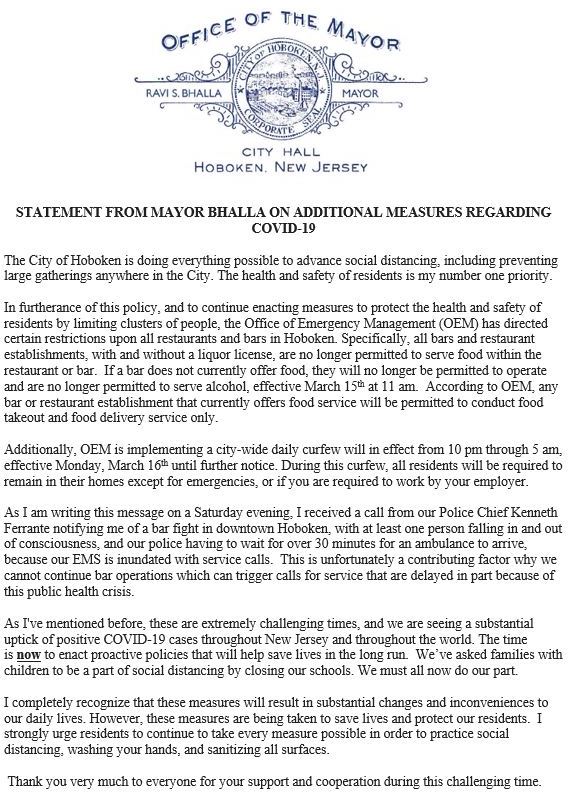

Sort of nice, but not satisfying for me. The tweet below says why: testing “methods” are very different. South Korea tests everyone, Italy only tests suspected cases.
• Coronavirus: Why It’s So Deadly In Italy (M.)
Many people have already pointed out that Italy has an older population than South Korea. The higher Italian CFR might therefore reflect a higher likelihood that an old person becomes infected with the coronavirus simply because there are more old people among the Italian population. We can easily check the plausibility of this argument by comparing the age structure of the coronavirus cases with the age structure of the total population for both countries. The population data are from the United Nations’ World Population Prospect 2019.
In South Korea, the age structure of the coronavirus cases is remarkably similar to the age structure of the population, in particular for the older age groups. The 20–29-year-olds are still hugely overrepresented among the confirmed cases relative to their population share, but their surplus is balanced by the underrepresentation of cases among the 0–9- and 10–19-year-olds. These three youngest age groups face a very low risk of dying from COVID-19. The South Korean CFR is hence not depressed or exaggerated by an under- or overrepresentation of older Koreans among the confirmed cases.
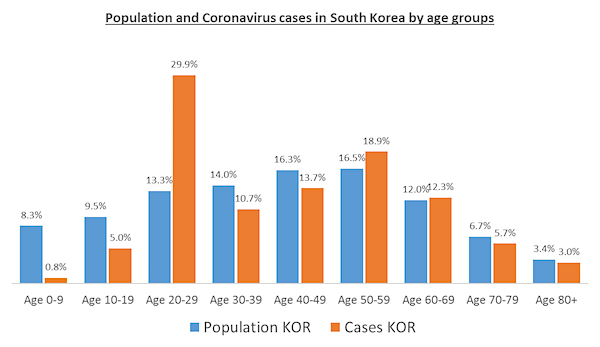
The same is not true for Italy: The share of confirmed cases at age 70–79 exceeds the population share of this age group by more than a factor of two. Among those aged 80 and more, the case share is almost three times as high as the population share. By contrast, young people and hence low-fatality-risk people are visibly underrepresented among the confirmed cases.
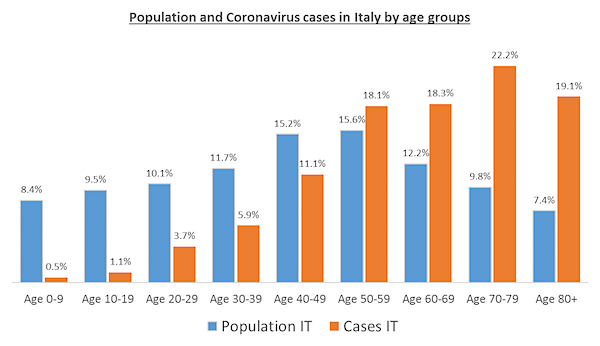
Hence, the question remains why the age distribution of cases is shaped so differently in Italy compared to South Korea. It has also been pointed out that the testing procedures for coronavirus in the countries are very different — Italy has predominantly been testing people with symptoms of a coronavirus infection, while South Korea has been testing basically everyone since the outbreak had become apparent. Consequently, South Korea has detected more asymptomatic, but positive cases of coronavirus than Italy, in particular among young people.
Here’s something that’s absolutely terrifying: a comparison of the age distributions of Covid-19 cases in Italy, where they are only testing people who show symptoms, and S. Korea, which has broad testing. A whole lot of 20-29yos out there who feel just fine but are v contagious. pic.twitter.com/BU96h3VKUc
— Mark Byrne (@markwby) March 14, 2020

The continent locks down. People expect this to last 2 weeks or so. What happens if that becomes 4 months?
• France, Spain Implement Massive and Dramatic Quarantine Restrictions (Slate)
More European nations have joined Italy in enacting dramatic measures meant to keep their citizens in their homes for all but the most necessary of circumstances in an effort to slow the spread of the novel coronavirus. On Saturday, Spain ordered all of its citizens to stay in their homes unless they absolutely have to leave to go to work, buy food, seek medical care, or help out elderly or otherwise vulnerable people in need of assistance. All bars, restaurants, and schools were ordered to close. France also ordered all restaurants, bars, cafes, movie theaters, and other “non-indispensable businesses” to close starting at midnight. Grocery stores, pharmacies, banks, and gas stations are some of the only exceptions.
Both countries had seen an uptick in cases in recent days. Spain saw 2,000 new cases on Saturday alone, bringing its total up to more than 5,700. The number of cases in France has recently doubled and the country now has around 4,500 confirmed cases. Italy, the country with the most cases after China, has been operating under these restrictions in a full quarantine since Monday. More than 21,000 people have contracted the virus there, and more than 1,440 people have died from it.
Some non-European countries have taken similar measures. Starting Sunday, all restaurants, cafes, calls, hotels, movie theaters, gyms, and schools in Israel will be closed. Israel, which has less than 200 cases, also banned any foreign visitors from entering the country and gatherings of more than 10 people. Iran, which follows Italy as the third hardest-hit, has closed all schools, universities, sporting events, cafes, restaurants, museums, and movie theaters. And like Italy, it cracked down on travel within the country.
The story of #covid19 so far… pic.twitter.com/TIFxCkzEgr
— Andrew Glover (@theandrewglover) March 14, 2020

Health care for profit doesn’t appear to be the best idea out there. In a nutshell: Systems need redundancy.
• UK Doctor: ‘We Don’t Have The Masks, Goggles – Or The Staff’ (G.)
NHS staff are asking the same questions as everyone else about coronavirus. How deadly is it? How do we protect ourselves? Are the government’s tactics right? And how will the health service cope when – and it is when – it leaves large numbers of people seriously ill, many fighting for their lives? These questions are even more pressing for us because within two weeks we will be part of the frontline against a threat that we’ve never seen the like of before. I’m worried that our hospital’s beds are already 98% full. We are full of “social patients” – people medically fit to go but who can’t be discharged because there isn’t a place in a care home for them, or the care package to allow them to go home hasn’t been sorted.
So where are all the people needing life-or-death care from Covid-19 going to go? We’re barely two weeks from being in the same situation as Italy, with huge numbers of people needing to be in hospital. Yet we don’t have enough protective equipment like masks and goggles. And the NHS is under-staffed. We have to haggle with management about a minuscule pay rise for doctors willing to work extra shifts and expose themselves to danger. We don’t have enough isolation rooms or ventilators, which will be vital. Intensive care units will be the NHS’s most precious resource, but ours are close to full most of the time. We’re told of plans to increase ICU capacity. Yet you need a specially trained nurse for each ICU bed. Where will the extra staff come from?
Too few beds, staff and equipment; I’m worried that the NHS is completely ill-equipped to handle Covid-19. When Boris Johnson talks about our wonderful NHS and how well-prepared it is, that’s bullshit. He either doesn’t have a clue or is trying to falsely reassure people. The NHS has been hit hard before, by underfunding, terrorist attacks and tough winters. But usually crises are stretched over a period of time. With coronavirus it will all come at once.
https://twitter.com/i/status/1238924372867461123

Just as Xi starts boasting about the approach, these guys try to spoil the party. Do a study like this for Italy too. And the US.
• China Could Have Cut 95% Of Cases If It Acted On Whistleblower Warning (HKFP)
China could have prevented 95 per cent of coronavirus infections if its measures to contain the outbreak had begun three weeks earlier, research from the University of Southampton suggests. However, China only took vigorous action in late January – weeks after police silenced a doctor for trying to raise the alarm. First detected in Hubei, more than 146,000 people globally have now been infected with Covid-19, whilst over 5,500 have died from the SARS-like disease. The study published this week by population mapping group WorldPop measured the effectiveness of nonpharmaceutical interventions. The researchers examined how China isolated ill persons, quarantined exposed individuals, conducted contract tracing, restricted travel, closed schools and workplaces, and cancelled mass gatherings.
The analysis – which has yet to be peer-reviewed – found that early case detection and contact reduction were effective in controlling the virus and combined measures can reduce transmission. They can also delay the timing and reduce the size of the epidemic’s peak, and thus buy time for healthcare preparations and drugs research. The simulations drew on human movement and illness data to model how combined interventions might affect the spread of Covid-19. Coronavirus cases could have been reduced by 66 per cent if the measures were taken a week earlier, the study suggested, or by 86 per cent if action began two weeks earlier. If action was taken three weeks later, then the situation could have worsened 18-fold.
Most efforts to tackle the outbreak took place in late January, weeks after Wuhan ophthalmologist Dr Li Wenliang tried to warn about the mystery disease on December 30. He was among eight people who were punished by police on January 1 for spreading “rumours” about the virus. The Public Security Bureau made Li sign a letter stating that he had made “false comments” and had “severely disturbed the social order.” He died last month of the disease, aged 34, prompting widespread outrage in China.
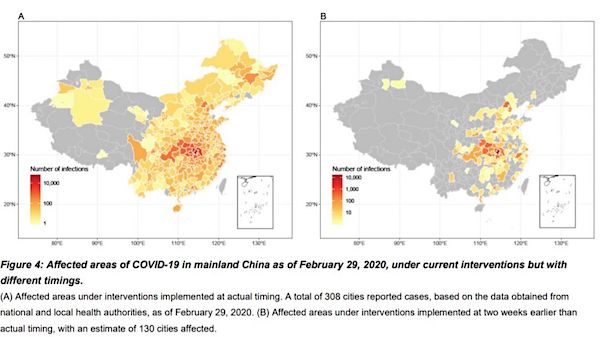

Reinfection, false negative?
• Japanese Man Tests Positive For Coronavirus, Again (NHK)
Officials in western Japan’s Mie Prefecture say a man who was a passenger on a cruise ship that was hit by the coronavirus has again tested positive after recovering from infection. The man, who is in his 70s, first tested positive for the virus on February 14 while he was onboard the Diamond Princess, which was under quarantine off Yokohama. He left a medical facility in Tokyo on March 2 after he was confirmed negative. He returned to his home in Mie by public transportation. But he started to feel sick and developed a fever of 39 degrees Celsius on Thursday. He went to hospital on Friday, and on Saturday was confirmed to be infected again. He is now receiving treatment at a hospital in the prefecture. Prefectural officials plan to trace his recent activities and carry out checks of people who have had close contact with him.

Something for our medical commentariat.
• Anti-Inflammatories May Aggravate Covid-19, France Advises (G.)
French authorities have warned that widely used over-the-counter anti-inflammatory drugs may worsen the coronavirus. The country’s health minister, Olivier Véran, who is a qualified doctor and neurologist, tweeted on Saturday: “The taking of anti-inflammatories [ibuprofen, cortisone … ] could be a factor in aggravating the infection. In case of fever, take paracetamol. If you are already taking anti-inflammatory drugs, ask your doctor’s advice.” Health officials point out that anti-inflammatory drugs are known to be a risk for those with infectious illnesses because they tend to diminish the response of the body’s immune system.
The health ministry added that patients should choose paracetamol because “it will reduce the fever without counterattacking the inflammation”. French patients have been forced to consult pharmacies since mid-January if they want to buy popular painkillers, including ibuprofen, paracetamol and aspirin, to be reminded of the risks. Jean-Louis Montastruc, the head of pharmacology at Toulouse hospital, told RTL radio: “Anti-inflammatory drugs increase the risk of complications when there is a fever or infection.”

We really need their greedy fingers in that too.
• Google Says It Is Developing A Nationwide Coronavirus Website (R.)
Alphabet’s Google said on Saturday that it was working with the U.S. government to develop a nationwide website that would help Americans with questions about coronavirus symptoms, risk factors and testing. “We are fully aligned and continue to work with the U.S. government to contain the spread of COVID-19, inform citizens, and protect the health of our communities,” Google said in a statement on Twitter. President Donald Trump had thanked Google on Friday for developing a website that he said would help people determine whether they needed a coronavirus test, saying that 1,700 engineers were working on it.
That prompted the search and advertising giant to respond that, in fact, a life sciences division, Verily, was in the early stages of developing a tool to help triage Americans who may need testing for the coronavirus and that it would be tested in the Bay Area and expanded over time. Alphabet’s shares closed up more than 9% after the Friday announcement by the president. Pressure has been rising on U.S. officials to increase and improve testing for the fast-spreading virus, which has reached almost every U.S. state, closed schools and forced the cancellation of thousands of sporting events, conferences and concerts amid efforts to stop its spread by keeping Americans out of big crowds.

But bloated corpses contain toxic and smelly gases.
• Fed May Announce Commercial Paper Facilities Sunday – BofA (R.)
The Federal Reserve may announce measures on Sunday night aimed at bolstering liquidity in the commercial paper market, used by companies for short-term loans, analysts at Bank of America wrote. The bank’s analysts said they believe the Fed will announce a Commercial Paper Funding Facility, an operation previously used in 2008 in which the Fed buys commercial paper from issuers directly, and a Commercial Paper Dealer Purchase Facility in which the Fed would buy commercial paper from dealers directly. The measures, if taken, would be aimed at buffering the market ahead of potentially large outflows from money market funds in coming days, analysts at the bank wrote.
“We believe it imperative the Fed roll out these facilities on Sunday night given the looming expected prime (money market fund) outflows and necessity of their ability to sell (commercial paper) in order to raise cash,” the report said. “If the Fed waits too long the (money market fund) outflow pressure could mount and the risk of a large scale (money market fund) run could increase.” Liquidity – or the ability for buyers and sellers to easily transact – has dried up in the commercial paper market in recent weeks as the coronavirus has roiled credit markets and hit the price of commercial paper. Expectations of a rush of new issuance has also driven prices lower.

“..the changes will result in the airline parking nearly its entire widebody fleet..”
• American Airlines To Cut Nearly All Long-Haul International Flights (R.)
American Airlines on Saturday said it will implement a phased suspension of nearly all long-haul international flights starting March 16, amid reduced demand and travel restrictions due to the ongoing coronavirus outbreak. Between March 16 and May 6, American will reduce its international capacity by 75% on a year-over-year basis, it said in a statement, adding the changes will result in the airline parking nearly its entire widebody fleet. The airline also anticipates its domestic capacity in April will be reduced by 20% on a year-over-year basis. Domestic capacity for the month of May will be reduced by 30%, the company added.
This is the scene at O’Hare airport. The traveler who took the photo said it’s a 6-hour wait for bags then on to customs for 2-4 more of waiting in shoulder-to-shoulder crowds. Police are handing out water and disinfectant wipes. @fly2ohare #ord #coronavirus #COVID19 pic.twitter.com/UTx9E0nj1s
— Brooke Geiger McDonald (@BrookeGMcDonald) March 15, 2020

First you bloat your company beyond proportions, then you demand your recently bloated shape is saved from normalizing.
Save people, not companies.
• Virgin Atlantic Boss Seeks £7.5 Billion UK Airline Bailout (R.)
Virgin Atlantic’s chairman Peter Norris will write to British Prime Minister Boris Johnson on Monday saying the country’s airline industry needs emergency government support worth 7.5 billion pounds ($9.20 billion) or risks the loss of tens of thousands of jobs, Sky News reported on Saturday. The letter would ask the British government to provide airlines with a credit facility to help them through a potentially prolonged period of slumping revenue amid the coronavirus pandemic, Sky News said, citing sources.

Snowing under in the virus.
• ‘Euroleaks’: Varoufakis Leaks Recordings Of Secretive Eurogroup Talks (RT)
The former finance minister of Greece, Yanis Varoufakis, has released a cache of audio files, secretly recorded in 2015 during the bailout talks with the Eurogroup – a powerful group of eurozone’s finance chiefs.
The recordings and their transcripts were released by Varoufakis on the website of his ‘pan-European’ DiEM25 party on Saturday. The files –dubbed ‘Euroleaks’– were recorded between February and July 2015, when cash-strapped Athens was entangled in painful talks with its creditors. In 2015, Varoufakis was the chief negotiator for then-ruling Syriza party, dealing with the Eurogroup and those behind it – the so-called ‘troika.’ It comprises the three main lenders of the eurozone nations – the European Commission, the European Central Bank and the IMF.While the Eurogroup is de-jure an informal group, it is actually a powerful decision-making institute that lacks accountability and transparency – and does not keep any records. The main goal in releasing the recordings is to shed light on its secretive activities, Varoufakis said in a video announcing the Euroleaks. The lenders took a tough, ‘take it or leave it’ stance on Greece, effectively presenting it with an ultimatum. At the same time, they blamed Greek negotiators for stalled talks – and no records were available to prove them wrong.
“You will hear the [then-]president of the Eurogroup [Jeroen Dijsselbloem] and other ministers warn me that if I dare table written proposals within the Eurogroup meetings, that would be the end of the negotiations,” Varoufakis said. “At the very same time they were leaking to the press that I was arriving at Eurogroup meetings without any proposals.” Apart from bringing into the limelight the “intransparent action by an unelected group of politicians who influence all our lives,” the leaks also serve another purpose. The putting in the public domain of the secret recordings is aimed at fighting attempts by the incumbent Greek government to “weaponize fake news,” produced by the Eurogroup back in 2015 to justify new austerity measures for the country, Varoufakis said.

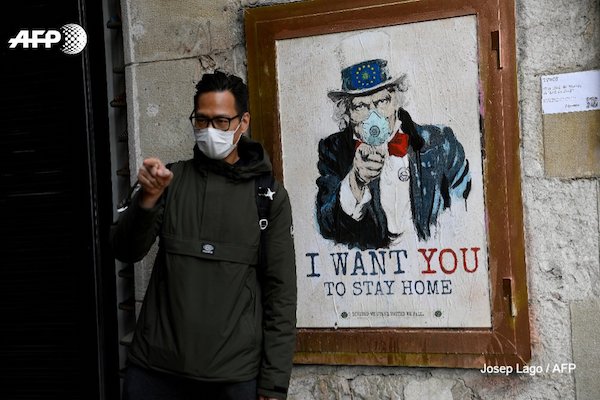

If you read us, please support us. Help the Automatic Earth survive.







